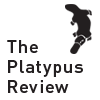The economic crisis, as many commentators and critics are quick to point out, has rekindled interest in—and anxieties over—Marxism. Although many on the Left hope this renewed curiosity marks the beginning of a radical turn, similar revivals of anti-capitalist politics in the 1930s, 1960s, and 1990s failed to achieve the revolutionary transformations they sought.
Has Marxism returned as a significant political force? How might this translate into the possibility for a revitalized Left? Will the resurgence of Marxist theory provide opportunities for social change—or merely the opportunity to fail again?
An interview with Dr. Leo Panitch conducted on February 19th, 2010, at the University of Toronto.
Dr. Leo Panitch is Canada Research Chair in Comparative Political Economy and Distinguished Research Professor of Political Science at York University in Toronto, and coeditor of the annual Socialist Register.
Transcript in Platypus Review #23:

A moderated panel discussion and audience Q-and-A on problems of strategies and tactics on the Left today, held on November 6, 2007, at the School of the Art Institute of Chicago. Panelists: Michael Albert (Z Magazine, author of Parecon: Life After Capitalism), Chris Cutrone (Platypus), Stephen Duncombe (Gallatin School of New York University, editor of Cultural Resistance Reader), Brian Holmes (Continental Drift and Université Tangente), and Marisa Holmes (new Students for a Democratic Society).
"After the failure of the 1960s New Left, the underlying despair with regard to the real efficacy of political will, of political agency, in a historical situation of heightened helplessness, became a self-constitution as outsider, as other, rather than an instrument of transformation. Focused on the bureaucratic stasis of the Fordist, late 20th Century world, the Left echoed the destruction of that world by the dynamics of capital: neoliberalism and globalization.
The idea of a fundamental transformation became bracketed and, instead, was replaced by the more ambiguous notion of 'resistance.' The notion of resistance, however, says little about the nature of that which is being resisted, or of the politics of the resistance involved.
'Resistance' is rarely based on a reflexive analysis of possibilities for fundamental change that are both generated and suppressed by the dynamic heteronomous order of capital. 'Resistance' is an undialectical category that does not grasp its own conditions of possibility; it fails to grasp the dynamic historical context of capital and its reconstitution of possibilities for both domination and emancipation, of which the 'resisters' do not recognize that that they are a part."
— Moishe Postone, "History and Helplessness: Mass mobilization and contemporary forms of anticapitalism" (2006)
Transcripted in Platypus Review #4 (Click below):


